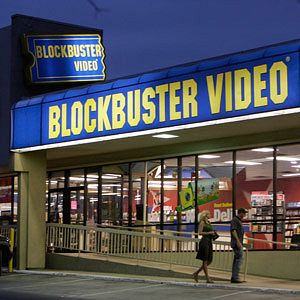 The skies continued to darken over Blockbuster on Thursday.
The skies continued to darken over Blockbuster on Thursday.
The struggling rental chain stumbled through another money losing quarter, recording a net loss of $65.4 million or 33 cents per share. In the same period a year ago, Blockbuster logged a net profit of $27.7 million, or 12 cents per share.
Revenue slipped to $939.4 million from $1.09 billion, slightly worse than analysts expectations. According to those polled by FactSet, Blockbuster was projected to record losses of $952.5 million and 12 cents per share for the first three months of the year.
The losses came at a time in which Blockbuster had successfully outmaneuvered key rivals Redbox and Netflix to become the premiere destination for new releases.
Bowing to pressure from studios such as Universal, Warner Brothers, and 20th Century Fox, the subscription service and the kiosk chain both agreed to honor 28 day delays on when they could rent new releases.
Unlike its competitors, the Dallas-based Blockbuster can sell and rent DVDs and Blu-rays from these studios beginning on their street date.
Yet many of these pacts had not gone into effect by the time the quarter closed on April 4. The chain undoubtedly was helped from its status as one of the only places to rent hit films such as "Avatar" and "It’s Complicated," an advantage that is not reflected in the latest earnings report.
Blockbuster says that under its current agreements it has a 28-day leg up on nearly half of all new releases.
Though Chairman and CEO Jim Keyes tried to remain sanguine in the face of a seemingly endless stream of bad news, he acknowledged that the next 12 to 18 months would remain "challenging."
He also attempted to dampen rumors that Blockbuster’s mountain of debt might force it into bankruptcy protection.
“During the first quarter we continued progress to recapitalize our business. We have had encouraging discussions with both financial and strategic partners and expect to have additional details to report by our annual stockholders’ meeting in late June,” Keyes said in a statement.
Legal fees associated with restructuring and closing costs associated with shuttering hundreds of stores increased expenses for the beleaguered company, but thanks to new agreements that allowed them to access discs at a lower price, the company’s gross margin rose to 53.5 percent from 52.8 percent.
Though Keyes said that the new agreements with studios and store closures had helped improve same-store business trends, in fact, those sales continued to slide. Domestically, same-store sales fell 7.8 percent and dropped 5.8 percent internationally. Same-store rental revenue in the United States dropped 6.4 percent, and retail revenue slid 14 percent, which Blockbuster attributed to competition from Netflix and Redbox.
In addition to the bump, Keyes predicted that the company would receive from the favorable new release terms, the CEO also speculated that the bankruptcy of the company’s cheif bricks and mortar rival Movie Gallery would also boost revenues. Movie Gallery, which owned the Hollywood Video and Game Crazy chains, liquaidated its remaining 1,000 stores in April.
Going forward, Keyes said Blockbuster would continue to move into the kiosk and mobile phone markets. Blockbuster currently operated over 4,000 kiosks through a partnership with NCR, and offers movies for download on T-Mobile’s HTC HD2 smart-phone.
Blockbuster shares fell 20 percent to 39.9 cents in extended trading on the New York Stock Exchange.
Read also:
Blockbuster CEO Keyes: ‘We’re Rocky 10’


